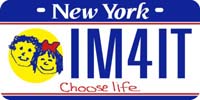A panel of federal judges has ruled that New York violated the First Amendment rights of car owners who want their tags to declare “Choose Life.”
The U.S. 2nd Circuit Court of Appeals had already ruled in 2006 that a lawsuit between anti-abortion activists and New York’s Department of Motor Vehicles could move forward. However, the new decision ends seven years of legal sparring.

“This court has found the sole basis for defendants’ denial of Children First Foundation’s license plate application was viewpoint discrimination,” reads the decision. “Accordingly, the court finds that defendants’ restriction was both discrimination based on viewpoint and unreasonable. New York has run afoul of the First Amendment by giving the commissioner unbridled discretion to engage in viewpoint discrimination,” the court noted.
By blocking any “Choose Life” license plates since 2002, New York is in the minority of states, notes the Children First Foundation‘s website, “given that a solid majority of 28 other states have already approved pro-adoption ‘Choose Life’ plates.”
The court ordered New York to approve the specialty plate, which features a child-style crayon drawing of smiling children and the words “Choose Life” across the bottom. The head of the state DMV had called the design “offensive.”
The foundation is a non-profit organization that promotes adoption as a choice for women with unwanted pregnancies or newborns. The group first applied for a custom plate through the DMV’s specialty plate program in 2001. Like other states, New York allowed vehicle owners to display specialty license plates promoting a message or cause.
However, DMV’s then-Commissioner Raymond P. Martinez denied the application. He referred to a previous denial in 1998 when DMV said car owners could not “promote or display politically sensitive messages,” on New York license tags — which could provoke “road rage.”
The foundation, which was assisted in the lawsuit by the Alliance Defense Fund, complained that his decision was illegal “viewpoint discrimination.” Again in 2002, a new application was rejected because DMV found the message “patently offensive and could provoke outrage from members of the public.”
The foundation submitted a new design in 2003, which was also rejected.


